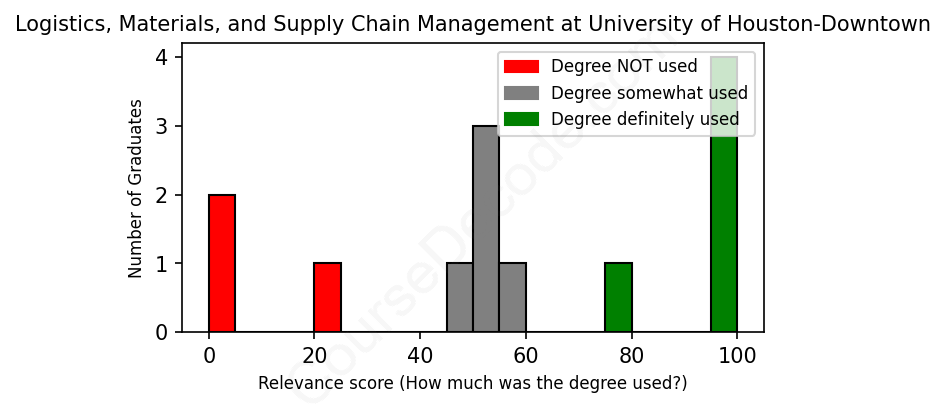
First, some facts. Of the Logistics, Materials, and Supply Chain Management graduates from University of Houston-Downtown we've analyzed , here's how many have used (or NOT used) their degree in their career:

These are estimates based on AI analysis of 13 LinkedIn profiles (see below).
The verdict? Below average. Overall, with an average relevance score of 57%, Logistics, Materials, and Supply Chain Management graduates from University of Houston-Downtown have a lower likelihood (-10%) of finding work in this field compared to the average graduate across all fields:
And for comparison, here's the chart for all profiles we've looked at across all degrees.
Also, after graduating, only 15% of these graduates have pursued further education other than another Bachelor's degree (such as a Masters degree or other), compared to the average across all profiles of 35%. This suggests a Bachelors degree is enough for most Logistics, Materials, and Supply Chain Management graduates, and it's normal to look for work straight after graduation.
See the details:
|
Relevance score: 50% We think this person has gone into a career only somewhat relevant to their degree. We think this person has gone into a career only somewhat relevant to their degree.
DEGREE INFOGraduated in 2017 from University of Houston-Downtown with a Bachelor of Applied Science (B.A.Sc.) in Logistics, Materials, and Supply Chain Management. Also pursued further education since (see below). JOB HISTORY SINCE GRADUATIONAML USL D&I S&C Business System Analyst - Software Integrated Solutions (SIS) Schlumberger Nov 2017 - Present FURTHER DEGREES DONE SINCE GRADUATINGMaster of ScienceUniversity of Houston-Downtown 2020 - 2022 ABOUTMaster of Science, Data Analytics graduate, currently a business system analyst with a demonstrated history of working in the oil & energy industry using Microsoft Applications, Power BI, SAP, Software Business Solution applications. I welcome the opportunity to explore future role in AI, Data Analyst, Data Engineer, Data Science. |
The top 10 most common jobs done by the graduates we've analyzed (ranked most common to least) are:
From the profiles analyzed, it looks like graduates from the University of Houston-Downtown with degrees in Logistics, Materials, and Supply Chain Management have taken on a pretty varied range of jobs. The most common roles that align well with their degrees include positions like Logistics Coordinators, Supply Chain Specialists, and Procurement Buyers. These roles clearly apply the logistics and supply chain concepts they learned in school, so you can see a direct connection between their education and their job functions. For instance, roles like the Procurement Specialist at LyondellBasell or the Supply Chain Professional at Chevron Phillips clearly utilize that specific knowledge daily, which is super relevant.
On the flip side, there are also quite a few jobs that don't really connect to the logistics and supply chain field as strongly. Some graduates have ended up in customer service roles, office management positions, or even as bakers or jewelers, where the tie to their degree is pretty loose at best. For example, working as a Sales Consultant or a Bakery Clerk might hone some organizational skills, but they don’t really put their logistics knowledge to good use. This mixed bag shows that while many of these grads are landing relevant positions in logistics, some are veering off into other areas that aren’t directly related to their studies. Overall, there's a good number of grads in roles that match their degrees, but there's also a noticeable number in jobs that don’t make the most of their education. It's a bit of a mixed bag!
Here is a visual representation of the most common words in job titles for Logistics, Materials, and Supply Chain Management graduates (this is across all Logistics, Materials, and Supply Chain Management graduates we've analyzed, not just those who went to University of Houston-Downtown):

Graduates from the University of Houston-Downtown who studied Logistics, Materials, and Supply Chain Management seem to launch into a variety of roles in the supply chain field after they toss their caps in the air. Many of these folks start off in positions like logistics coordinators, procurement buyers, or even roles that blend customer service and operational tasks, like office management or sales consulting. It’s pretty common to see them picking up jobs that serve as stepping stones, building their experience and network in logistics and supply chain industries as they gain practical skills. Some early positions are quite aligned with their degree, while others veer a bit off the path, but overall, there's a decent foundation for further growth.
Fast forward five to ten years, and you can see a pretty positive trend among these graduates. Many of them are pushing into more specialized roles such as Supply Chain Specialists, Inventory Control Specialists, or even more technical positions like Business Systems Analysts. The variety is interesting; while some have stayed close to the logistics core of their degree, others have ventured into adjacent areas or even took a detour into entirely different fields, such as jewelry and restaurant management. However, those who have maintained a focus on logistics and supply chain management seem to be having successful careers with notable companies, indicating that a degree from UHD in this field can really open up some solid doors for career advancement. Overall, it looks like these graduates are doing well within their field, translating their education into a mix of practical experience and career growth.
Honestly, a Bachelor’s degree in Logistics, Materials, and Supply Chain Management at the University of Houston-Downtown is pretty manageable compared to some other majors. It usually involves a mix of business fundamentals, analytical skills, and some practical applications, which can be easier if you enjoy problem-solving and working with data. While there are definitely challenging aspects, like understanding complex supply chain dynamics and perhaps crunching some numbers, many students find it to be a straightforward and engaging path. Plus, since the program is designed with real-world applications in mind, it tends to stay relevant and interesting, which can make studying feel less like a slog. So overall, I'd say it's around average in terms of difficulty—definitely doable!
Most commonly, in the LinkedIn profiles we've looked at, it takes people 2 years to finish a Bachelor degree in Logistics, Materials, and Supply Chain Management.
Looking at these graduates from the University of Houston-Downtown, it seems like many of them have landed decent jobs in logistics, supply chain, and related fields, which typically pay pretty well. For instance, roles like Supply Chain Specialist or Procurement Specialist usually come with solid salaries, and those working at established companies like Chevron Phillips Chemical likely earn a good amount too. However, some of the earlier positions, like in customer service or entry-level logistics roles, probably didn't pay as much. Overall, it looks like they're on the right track to making decent money, especially as they gain experience and move into more specialized roles. So, if you're thinking about studying logistics or supply chain, it seems there's a chance to earn a good living down the road!
Here is a visual representation of the most common words seen in the "about" section of LinkedIn profiles who have a Bachelor degree in Logistics, Materials, and Supply Chain Management (this is across all Logistics, Materials, and Supply Chain Management graduates we've analyzed, not just those who went to University of Houston-Downtown). This may or may not be useful:

Here are all colleges offering a Bachelor degree in Logistics, Materials, and Supply Chain Management (ordered by the average relevance score of their Logistics, Materials, and Supply Chain Management graduates, best to worst) where we have analyzed at least 10 of their graduates:
| College | Score | Count |
|---|---|---|
 Michigan State University Michigan State University
|
84 | 23 |
 Auburn University Auburn University
|
83 | 19 |
 Ashford University Ashford University
|
82 | 12 |
 University of Wisconsin-Milwaukee University of Wisconsin-Milwaukee
|
81 | 10 |
 Rutgers Business School Rutgers Business School
|
79 | 24 |
 Penn State University Penn State University
|
78 | 21 |
 Embry-Riddle Aeronautical University Embry-Riddle Aeronautical University
|
78 | 10 |
 Arizona State University - W. P. Carey School of Business Arizona State University - W. P. Carey School of Business
|
78 | 14 |
 Iowa State University Iowa State University
|
77 | 14 |
 University of Houston University of Houston
|
76 | 30 |
 University of Arkansas University of Arkansas
|
76 | 18 |
 University of Tennessee, Knoxville University of Tennessee, Knoxville
|
75 | 15 |
 University of North Texas University of North Texas
|
69 | 14 |
 Texas A&M University Texas A&M University
|
67 | 27 |
 Georgia Southern University Georgia Southern University
|
62 | 13 |
 The Ohio State University The Ohio State University
|
60 | 10 |
 University of Houston-Downtown University of Houston-Downtown
|
57 | 13 |